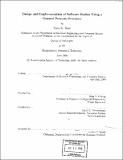Design and implementation of software radios using a general purpose processor
Author(s)
Bose, Vanu G. (Vanu Gopal)
DownloadFull printable version (9.912Mb)
Alternative title
Software radios using a general purpose processor
Other Contributors
Massachusetts Institute of Technology. Dept. of Electrical Engineering and Computer Science.
Advisor
John V. Guttag and David L. Tennenhouse.
Terms of use
Metadata
Show full item recordAbstract
This dissertation presents the design, implementation and evaluation of a novel software radio architecture based on wideband digitization, a general purpose processor and application level software. The system is designed to overcome the many challenges and exploit the advantages of performing real-time signal processing in a general purpose environment. The main challenge was overcoming the uncertainty in execution times and resource availability. The main advantages are faster clock speeds, large amounts of-memory and better development environments. In addition it is possible to optimize the signal processing in conjunction with the application program, since they are running on the same platform. The system has been used to implement a virtual radio, a wireless communication system in which all of the signal processing from the air interface through the application is performed in software. The only functions performed by dedicated hardware are the down conversion and digitization of a wide band of the RF spectrum. The flexibility enabled by this system provides the means for overcoming many limitations of existing communication systems. Taking a systems design approach, the virtual radio exploits the flexibility of software signal processing coupled with wideband digitization to realize a system in which any aspect of the signal processing can be dynamically modified. The work covers several areas, including: the design of an I/0 system for digitizing wideband signals as well _as transporting the sample stream in and out of application memory; the design of a programming environment supporting real-time signal processing applications in a general purpose environment; a performance evaluation of software radio applications on a general purpose processor; and the design of applications and algorithms suited for a software implementation. Several radio applications including an AMPS cellular receiver and a network link employing frequency hopping with FSK modulation have been implemented and measured. This work demonstrates that it is both useful and feasible to implement real-time signal processing systems on a general purpose platform entirely in software. The virtual radio platform allows new approaches to both system and algorithm design that result in greater flexibility, better technology tracking and improved average performance.
Description
Thesis (Ph.D.)--Massachusetts Institute of Technology, Dept. of Electrical Engineering and Computer Science, 1999. Includes bibliographical references (p. 113-116).
Date issued
1999Department
Massachusetts Institute of Technology. Department of Electrical Engineering and Computer SciencePublisher
Massachusetts Institute of Technology
Keywords
Electrical Engineering and Computer Science.